The Economy of Francesco is an event commissioned by Pope Francis. Dubbed as the Pope’s Davos,[1] with young people and Nobel laureates, the international event drew young economists and entrepreneurs from all over the world as protagonists. From November 19-21, 2020, two thousand young entrepreneurs met via streaming together with many experts in the economic, political, and social sectors to build inclusive and sustainable models and to make concrete proposals for a better future. Three days live from the Basilica of St. Francis in Assisi, Italy.
First Day – No One Left Behind
November 19: The various “Villages” presented online the projects for a new economy on a human scale, conceived over long months of preparation. The event kicked off at 2 pm from Assisi with “Listen to the cry of the poorest to transform the earth,” a video by the international movement ATD Fourth World (All Together in Dignity to Overcome Poverty), a non-profit organization that aims for the eradication of chronic poverty through a human-rights based approach. In his introductory message, Cardinal Peter Turkson, the Prefect of the Dicastery for Promoting Integral Human Development, addressed the young organizers: “You have decided to build a global network of young leaders and bearers of change in the economic field, a network that can ‘give a soul to the economy of the future.’ And in response to the pandemic, you are trying to help Pope Francis, the Church, and the whole world to come out better by imagining and developing a different, inclusive and sustainable economy that can help us behave as brothers and sisters living in a common home. Thanks for your hope and perseverance.”
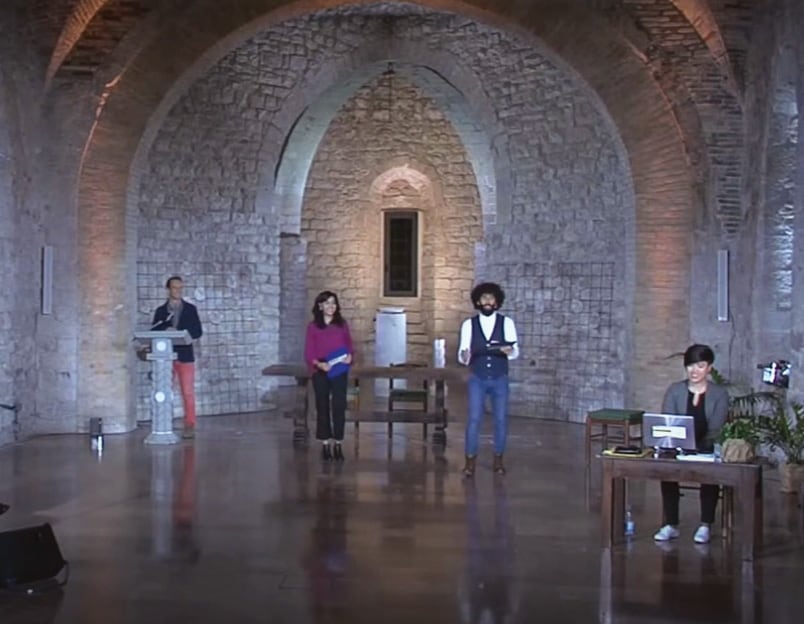
Some members of the organizing committee also took an active part in the event. The Bishop of Assisi, Domenico Sorrentino, welcomed young people to the city of the Poverello (St. Francis of Assisi ). The mayor of Assisi, Stefania Proietti, also greeted and received the youth participants. The president of the Seraphic Institute of Assisi, Francesca Di Maolo, spoke as well, with an exhortation to young people: “Build an inclusive economic system, which no longer produces even a single victim, nor a single person set aside. There will be no development or progress without taking care of the most fragile members of society. You can change the current economic system.”
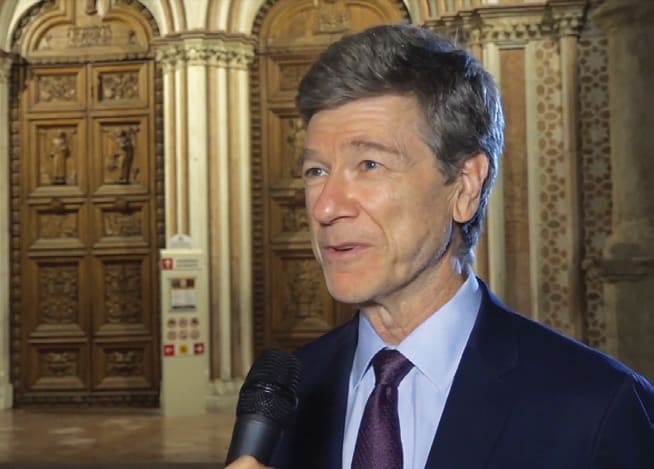
The online meetings saw the participation of important international speakers. The economist Jeffrey Sachs opened the conferences with “Perfecting Joy: three proposals to let life flourish.” During the event, the proposal for a Child Flourish Index was presented, an index to evaluate the well-being of children. Prof. Sachs himself affirmed that he was willing to collaborate in the project: “The Sustainable Development Solutions Network that I manage has developed various indices concerning happiness, based on data and indicators also of child well-being. We need pioneering ways, and some of these can be very useful. There are ways in the interconnected world that allow us to obtain this information today to be then processed, and to propose solutions to political operators.”
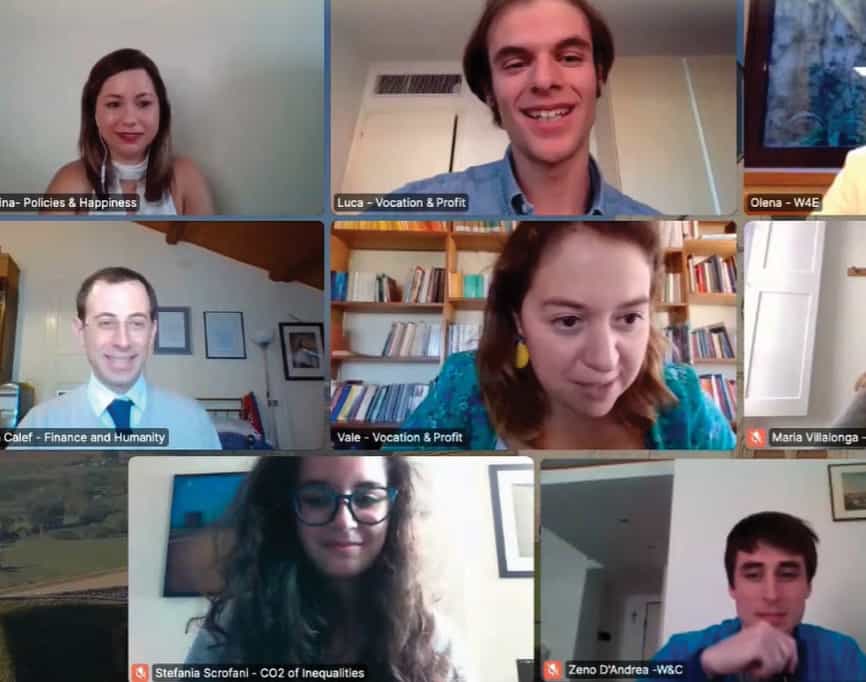
In the meeting “Peace economics and industrial reconversion: a recovery plan for the world,” the lecturers Raul Caruso, Juan Camilo Cárdenas, and Susy Snyder, addressed the issue of the relationship between economy and peace. In particular, the Director of CESPIC (European Center of Peace Science, Integration and Cooperation), and professor of Peace Economics at the Catholic University of Milan, Prof. Raul Caruso, dealt with the delicate issue of the relationship between public interest and the private sector in the pursuit of peace: “This aspect is particularly relevant if we look at the military industry in which private incentives often tend to collide with the interest of the community. There is also a role of the private sector in allocating its resources to investments that are not a harbinger of conflicts but rather are engines of resolution of the same.” In the panel “The state of food insecurity,” the Chief Economist of FAO (Food and Agriculture Organization), Maximo Torero, addressed the issue of poverty and food crises in times of pandemic: “Even before the arrival of COVID-19, there were significant challenges, with 690 million hungry people in the world. The pandemic has exacerbated the situation even more and increased inequalities.”
Second Day – No Turning Back
November 20: The next day saw the participation of the winner of the 2006 Nobel Prize for Peace, Muhammad Yunus. In his speech “Finance and Humanity: a road towards an integral ecology,” the creator of microcredit paved the way for a paradigm shift: “The COVID-19 pandemic revealed all the weaknesses of the current system. Those who were on the fringes of existence globally ended up even more marginalized. He continued, “Now, everyone is working to return to the situation before the pandemic. But why do we want to go back to that system, which was terrible? The train that was taking us to our death has stopped. It’s time to get off and ask ourselves: Do we want to get back on that train or go in the opposite direction: a world without pollution, without wealth concentration, without massive unemployment?”
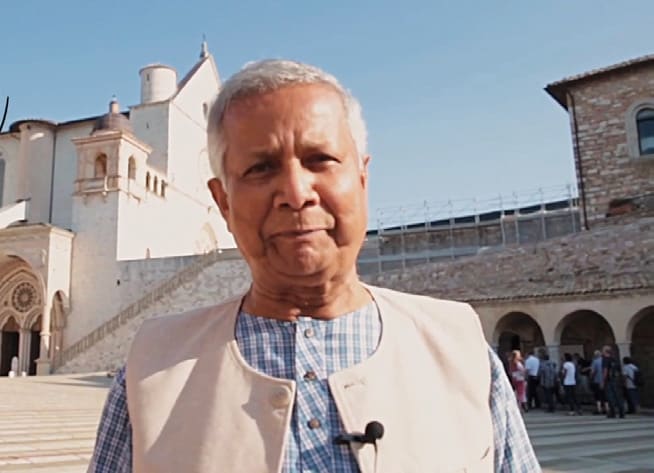
Also of central importance was the meeting with environmental activist and member of the International Forum on Globalization, Vandana Shiva: “The economy should take care of our common home. If we work in harmony with nature, we create well-being. The keywords must be: local distribution, healthy food, return to the Earth what the Earth gives us, and sharing. Returning to the earth what it offers us, we’ll have better food. The spirit is that of gratitude, of service, and of care.”
Third Day – Starting Processes
November 21: On the last day was the much-awaited message of Pope Francis, “Thank you for being there, for all the work you have done, for the commitment of these months, despite the change of plans. You have not been discouraged…” Thus began the video message that Pope Francis sent to the young participants of the Economy of Francesco.
Here are some excerpts from the Pope’s message.
“The severity of the current situation, which the COVID pandemic has made even more evident, requires a responsible awareness of all the social actors, of all of us, among whom you have a primary role: the consequences of our actions and decisions will affect you firsthand, so you cannot stay out of the places where it is generated, I am not talking about your future, but your present. You cannot stay out of where the present and the future are generated. Either you are involved, or history will pass over you.”
“Heaven grants that, in the end, there are no longer “the others,” but that we learn to mature a lifestyle in which we know how to say “we.” But a big “we,” not a little “we,” and then there are “the others,” no. This is not right.” “It is time for them to become protagonists of their life as well as of the entire social fabric. Let’s not think for them; let’s think with them. Remember the legacy of the Enlightenment, of the enlightened elites. All for the people, nothing with the people. And this is not right. Let’s not think for them, let’s think with them. And from them, we learn how to advance economic models that will benefit everyone…”
“It is time, dear young economists, entrepreneurs, workers, and business executives, it is time to take the risk of encouraging and stimulating models of development, progress and sustainability in which people, and especially the excluded (and among them also Sister Earth), cease to be – at best – a purely nominal, technical or functional presence, and become protagonists of their life as well as of the entire social fabric.”
“If it is urgent to find answers, it is essential to grow and support leading groups capable of developing culture, starting processes – do not forget this word: starting processes – tracing paths, broadening horizons, creating belonging…”
Youth as leaders
“These days were something unexpected, a great surprise. We were moved by looking at what you are doing,” said Luigino Bruni, Scientific Director of The Economy of Francesco. “We feel you close even if behind the screen. The Economy of Francesco is a solid and lively community, and we do not want to waste this wealth. We in the Scientific Committee want to keep this network alive, and it has three layers. The regional Hubs, where you can act and be protagonists, the Village you have created, the Village Hubs, an opportunity to continue working on specific issues, and then the Worldwide Hub. In these three days, we have seen how rich it is and we will do our best to meet you all, in person, in Assisi. Until then, one thing is already clear to us: we have never been leaders of Francesco’s economy, you are the leaders of this process and we are here to support you,” said Sister Alessandra Smerilli, a member of The Economy of Francesco Scientific Committee.
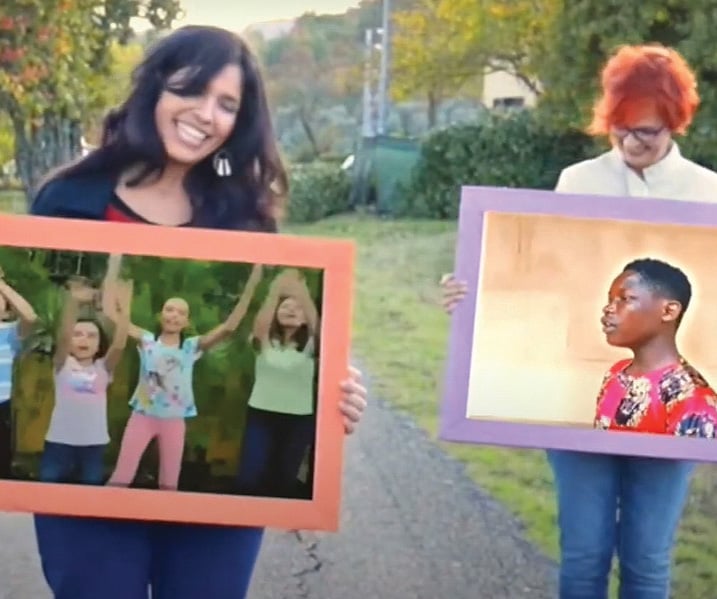
“Hundreds of thousands of young people have connected with Assisi from all over the world for an economic pact that looks at the future, and it is already a revolution. Students, economists, and entrepreneurs met from over 115 countries and discussed – said the director of the information structure, Father Enzo Fortunato – what the economy of tomorrow will be, which will not be for the last, but with the last.” The management was entrusted to an Organizing Committee composed of the Diocese of Assisi, the Seraphic Institute, the Municipality of Assisi, the Focolare Economy of Communion in Freedom Project, the Franciscan Families and with the support, on behalf of the Holy See, of the Dicastery for Promoting Integral Human Development, which sponsors the initiative.
The protagonists of the digital event are 2,000 young people under 35 years old from all over the world; economists, entrepreneurs, students, change-makers, and social operators, all driven by the common goal of building a more equitable and sustainable world – the common good. To celebrate the occasion, on November 21 at around 11 pm, Italian time, the monument of Christ the Redeemer in Rio de Janeiro, Brazil, was illuminated with the symbolic colors of the “The Economy of Francesco”: green, brown, and yellow.
Compiled by Jose Aranas
To get to know more about the Economy of Francesco event, you may visit https://francescoeconomy.org
[1] The informal name of the annual four-day conference held by the World Economic Forum in Davos-Klosters, Switzerland.




